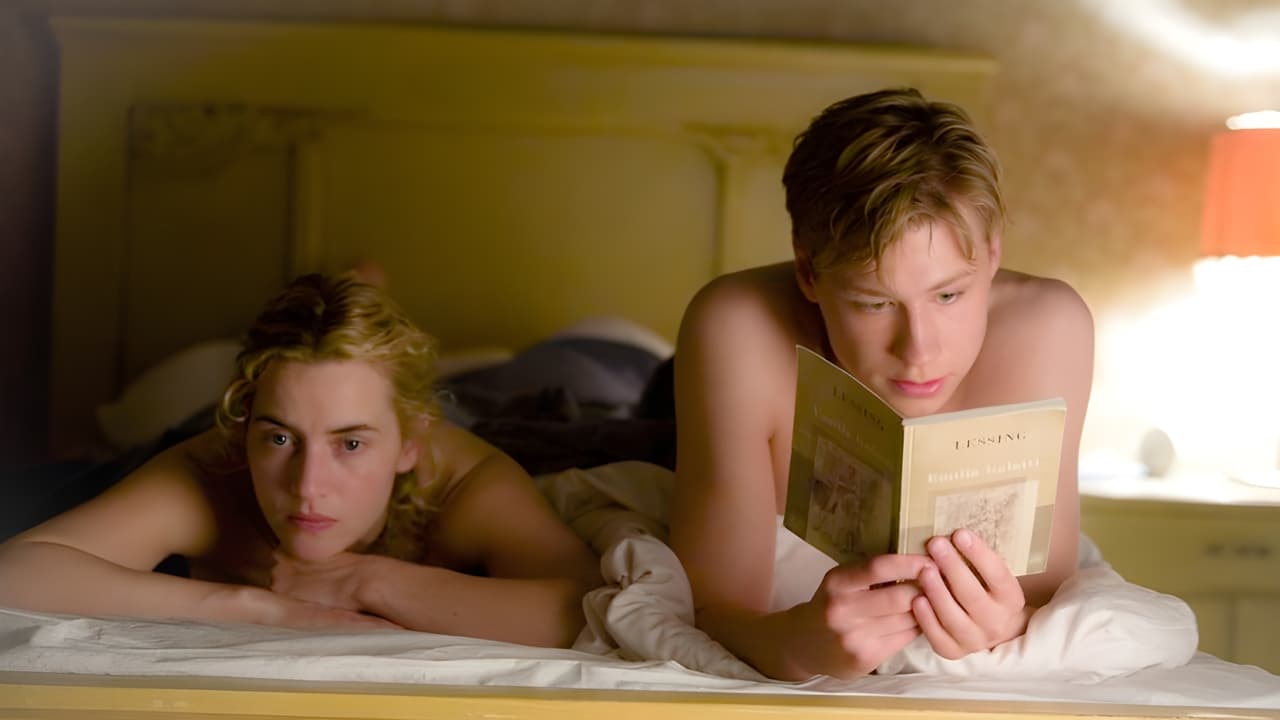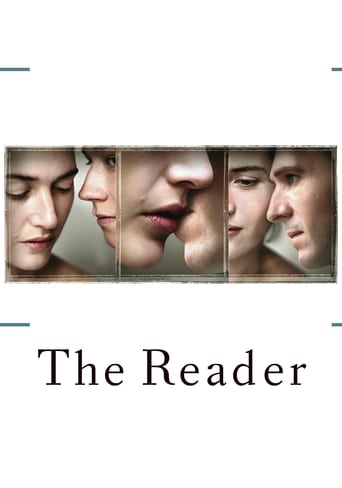Tyreece Hulme
One of the best movies of the year! Incredible from the beginning to the end.
Calum Hutton
It's a good bad... and worth a popcorn matinée. While it's easy to lament what could have been...
Raymond Sierra
The film may be flawed, but its message is not.
Haven Kaycee
It is encouraging that the film ends so strongly.Otherwise, it wouldn't have been a particularly memorable film
The Movie Diorama
This is an interesting one. Often regarded as an "Oscar-bait" film due to its subject matter and focus on acting. I never believe this term to be a detriment, in fact it evidently shows here because I thoroughly enjoyed this. A young boy has an affair with an older woman during one summer, she disappears after a promotion which is soon revealed to be a guard at a concentration camp. I shan't say too much in regards to the story, but this is very much what I call a "story film". We have a beginning, middle and end which are suitably implemented into a straightforward accessible narrative. Evoking themes of love, truth and reconciliation, I found this to be an endearing and sentimental story without the need of overacting and melodrama. I find that Kate Winslet often overacts, to a point where I dislike her. However, here she gives undoubtedly her best performance. Why? Because it's nuanced. No massive outbursts, no overly animated scenes. It's just her talking and taking control of every scene. Her subtlety and fragility is what captivated me. The character she portrays is shrouded in mystery and is psychologically intriguing, particularly as it is revealed she is unable to do a certain thing which all of us take for granted (I shan't say). Whereas David Kross and Ralph Fiennes' character, both may I just say were extremely competent, brings the heart and soul of the story. Love is a powerful emotion, one that cannot be fabricated or falsified. Ultimately, I believed in the relationship between these characters despite the events that take place. Loved the musical score as well, suited the film brilliantly. I did find the ending was slightly underwhelming, I would've liked it to be more impactful. Certain scenes did drag on however the pacing overall was fine. There is a lot of nudity, no idea why but the two main characters are always naked. Literally. The Reader might be too safe in its subject, but you cannot deny it's still a captivating watch and adequately moody.
Raj Doctor
The story is based in post World War 2 Germany, shown inter-linked in three parts:First part, where a teenage boy Michael Berg (David Kross) falls in LOVE with a young working girl Hanna Schmitz (Kate Winstel) who is double his age. Second, where the boy Michael is a young graduate lawyer and is attending a court seminar where Hanna Schmitz is accused of being a complicit guard at a Nazi prison where 300 people are murdered.Third, where Michael (Ralph Finess) a well established lawyer secretly supports Hanna's 20 year prison sentence and after release when she commits suicide, he fulfills her wish.The first and third part are the most engrossing and entertaining where romance between these two protagonist brims every frame.The main spine of the movie is Hanna's illiteracy that she is ashamed of. During part one - Hanna insist that Michael reads out all story books and novels to her before having sex with her. During part two - Hanna's secretive about her illiteracy during court proceedings lands her in a life-time sentence compared to her other co-guards who only get 2-3 years of jail sentence.In part three - the part one romance of story reading is recreated again when Hanna is in prison - and Michael sends her audio tapes of all the books he had read to her. Through these tapes Hanna learns to read and writes to the extend that she can form a small sentence and send it to Michael. Those scenes are exceptionally executed with tenderness and LOVE. Even a three word sentence of Hanna written to Michael brings tears to our eyes.Michael is shown torn between hating Nazi criminal and his romantic love interest - Hanna. The last scene of Michael and Hanna meeting each other after almost 40 years face to face is extremely heart-breaking. Without saying much Kate personifies her LOVE by screaming through her eyes, body language and hidden emotions that she wants to be with her LOVER Michael who is unwilling to help her beyond a point. This realization leads Hanna to commit suicide.Hanna's character screams at us as audiences for empathy and sympathy and all credit to the master-class performance of Kate Winstel for it - incredibly portrays an Oscar winning role.Apart from these two main characters - other roles are passe. The movie is adapted from the novel by the same name written by Bernhard Schlick who is himself a lawyer and author. The Direction by Stephen Daldry is excellent.A must watchOverall my rating for the movie is 7.5 out of 10.
classicsoncall
Wow, I don't know what to make of this picture. It's so good as a fictional story that it feels like it could be a true one. It presents many moral dilemmas, not the least of which is it's treatment of Hanna Schmitz (Kate Winslet) as almost a sympathetic character when in reality she was something of a monster. During her trial, Hanna uses a standard defense used by many former Nazi defendants who stated that they were merely doing their job in whatever capacity they were employed. In one respect, one could almost make the case that there was an element of mental illness involved in her make up, particularly when she comments on why she didn't allow the prisoners in the burning church an opportunity to escape and survive. There's that, and Hanna's overwhelming obsession to keep her illiteracy a secret, to the extent of taking the fall for the other women on trial with her who may have had even more culpability, if that were even possible.I'd like to say that Kate Winslet deserved her Best Actress Win for the picture but I haven't seen any of the other films her competition appeared in. Strictly speaking though, Winslet's performance arcs through all the ranges of human experience one can imagine and presents a thoroughly conflicted character. Ralph Fiennes also turns in a worthy performance, and I would have to concur with another reviewer who felt that the character Michael Berg may indeed have lived a wasted life. His attempt at rehabilitating Hanna in her prison cell may have seemed noteworthy, but one wonders how much of it was done out of compassion and how much out of guilt.What probably appalled me most about the story was when the five women on trial with Hanna all received a mere sentence of four years and three months for their role as concentration camp guards. Even if one were to apply some sort of moral equivalency to their role along side Hanna, the idea that Hanna received a life sentence made their punishment seem minor by comparison. All because their feigned indignation made Hanna out to be the leader of the group, when in fact, any one of them could have expressed some humanity during the church incident that the others might have fallen in line with.
krocheav
As more and more people in modern society fail to clearly identify the difference between Love and Lust – it's little wonder there are so many poor marriages and divorce. 'The Reader' is yet another of the many, so-called 'romantic' movies, spinning yarns of the power of first 'love'. In this case, it's the love/lust between a 15yr old lad and a 36yr old woman named Hanna (Winslet). She, as it turns out was an SS guard in a Nazi death camp during WW11 – we all know this situation "she/they were just doing their job - like everyone else". This particular story begins more than a decade after her war service. Now she's working as a tram conductor and the lad, is a student whom she assists in the street - following his suffering a fever-induced vomiting session. She takes him to her apartment, cleans him up and then assists him back to his parent's home. He returns with flowers to thank her and before we know it she has her clothes off and heavily involved in instant seduction – better known as 'lust'.It's not always easy to figure just what screenwriter David Hare and director Stephen Daldry are wanting to highlight as the chief focus of their adaptation of Bernhard Schlink's novel (as it tended to be with this duo's earlier collaboration, 'The Hours' in '02). The first section concentrates too heavily on the sexual relationship - with over detailed sequences featuring heavy bouts of nudity and sexual experiments. Reviewer, Thelma Adams of the Huffington Post quite rightly identified these scenes as borderline child pornography (little more than abuse). This activity has been carefully set-up to be 'accepted' by the viewer as the 'norm' but, is it really quite so? Hanna is a troubled woman and often treats her 'Kid' harshly. Following their summer 'encounters', she eventually disappears and her 'kid' is left seriously distressed and confused.It's here, the movie shifts its tone to become an examination of a war crimes trial. More ambiguity within the writing surfaces - with what amounts to being heavy scrutiny of whether it's worse to publicly admit being 'illiterate' or someone who assisted with murdering hundreds of innocent people? The movie is well acted and slickly photographed yet, seems very long for its two-hour running time. While it obviously pleased the academy (it doesn't take much these days) and some audiences – it will, and has, left serious analytical thinkers unhappy with what they will clearly 'read' between the lines.

